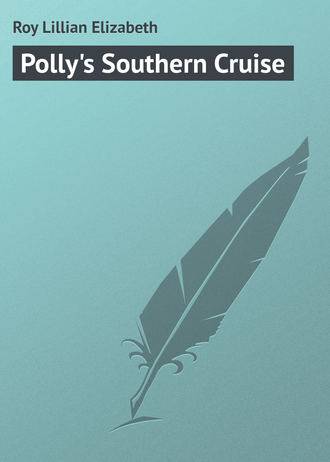
Polly's Southern Cruise
“Well, Mr. Dalken, no need to worry lest Jack buy out a partnership share with us, because we haven’t anything to sell. We leased the plantation on a basis which forbids any one sinking money in the scheme. If this year’s cane turns out well, and we reap any profits, then we shall feel like moneyed men – not now.”
As the cars drove on to visit the large plantation of the man who had leased the small one to the soldier boys, the latter explained that cane took about twelve months to mature; then after the first cutting another crop came on; the second crop was called ratoons. Sometimes it was possible, weather and cane both agreeing, to cut a third crop.
From the plantations Bill and Bob drove their guests to the big mills where the grinding was done. The cars passed several huge stand-pipes which were filled with water from artesian wells. This water was carried over the plantations in pipes and at regular intervals there was an open flume. Into the conduit the water was emptied daily and this form of trough carried the necessary moisture down the rows of cane to which it gave the stipulated quantity of water. All this work was regulated by automatic appliances easily handled and kept in order.
Bob now explained the method of planting cane. “They do not use seed, you know. The stalk is cut into sections of about two feet in length and these pieces are dropped into furrows and covered with soil.”
At the mill the visitors saw great piles of cane: some being cut, some being stripped, and some being piled upon great flat trucks all waiting to be taken to the freight cars which would carry them to the boats at Panama or at Colon.
The noise made by the great machines as they crushed, rolled, or poured the sugar from the cane, made conversation impossible. Bill next led his friends along beside the carrier which constantly moved the cane through the trough to feed the crushing machine. At the other side of this great machine the sweet juice poured forth in torrents.
The next process was that of pumping the cold juice into hot pans and then boiling the contents by steam. The skimming and liming work, and finally the feeding into the drying pans by means of coils of pipes, proved interesting but very tiresome because the heat of the mill was suffocating to the Northerners. Late in the afternoon the cars sped back to Colon and the two young planters were induced to stay to dinner on the White Crest.
“To-morrow we will take you up in the ’planes and have you enjoy a long ride, your last day at our Post,” remarked Bob at dinner.
“I feel perfectly safe in permitting the girls to go after having been up and seeing for myself how careful you boys are,” replied Mr. Dalken, graciously.
“I never thought I would enjoy a ride in the air, as I have always felt timid about going up in a ’plane,” said Mr. Fabian. “But I am so thrilled by the trial that I want Mrs. Fabian to try it.”
“No, thank you, sir! I am quite satisfied with good old Mother Earth,” laughed his wife.
Thus it happened on the following day that the two older ladies in the party preferred to stay down, but Mrs. Courtney and the girls, together with Jack and Ray, went forth to meet the aviators on the plain where the government hangars stood. They had two ’planes waiting and ready for the sail. A large seven-passenger machine and a smaller one which held the pilot and two others.
Into the large ’plane went Mrs. Courtney and Nancy Fabian and Ruth Ashby, after them went the two young men, Jack and Ray. At last the pilot Bob and his mechanician got in. Bill with Polly and Eleanor got in the small ’plane.
As the two aeroplanes began to ascend, Mr. Dalken called out: “Don’t go far! And don’t remain away more than half an hour!”
Those left behind stood and talked with a few of the army men who had accompanied Bill and Ray to the field. But after waiting for half an hour and no signs of returning ’planes could be seen or heard, the men said they thought Bill and Bob had descended near Panama in order to treat their company to afternoon tea.
Soon after this Mr. Dalken heard the faint far-off sound of a motor in the air, but no sight of it could be seen. Finally a speck was visible in the sky and in a short time the large ’plane descended upon the field, but not one vestige of the smaller one.
“Why!” exclaimed Bob, after he had assisted the ladies to get out of his ’plane. “Aren’t the others back yet?”
“No, did you miss them?” asked Mr. Dalken.
“I don’t know which direction Bill went. We tried to keep up with them, but that little ’plane is a hum-dinger for speed and it soon outstripped us. The last we saw of it was when it was speeding over Miraflores lock – right after that it disappeared and we saw no more of it. I flew over the same place but it was not there.”
“I hope nothing happened to them!” ventured Mrs. Courtney anxiously.
Before the group could decide upon any action, the sky suddenly clouded over again and the rain began to empty the rest of its water upon the section where the most damage might be done. Hence the aeroplane was rushed into its hangar and the storm-stayed visitors hurried into the empty hangar usually occupied by the small ’plane.
It was almost six o’clock when the rain ceased and permitted the tourists to return to their vessel. Jack and Ray went to the barracks with Bob because they were invited guests to dinner that evening.
Seven o’clock rang and darkness began to fall, yet no word had come from the absent aviators and every one began to worry over what might have befallen them.
“If we do not hear from them within the hour I shall go after them. The trains will probably run to Panama all night, and I will go there first and start a general search,” said Mr. Dalken.
The rain had ceased entirely now, and the night settled down, but no word or return of the absent girls. Then Mrs. Courtney took Mr. Dalken aside and made a suggestion.
“Suppose you accompany me to the telegraph station at Colon? From there we will send out wires to all the small and large stations on the line of the Canal. We may hear from some one in that way, and should we not get any favorable report you can go on to Panama.”
With a few words of explanation the two then left the White Crest and made their way to the station at Colon. Here they asked many questions of the telegraph operator and found out that there were many places all along the Canal where the stranded aviators might have secured shelter during the storm and also for the night.
But Mrs. Courtney said she would feel better if the messages were sent broadcast in order to reach some one who would reply. Hence they began to fill out the blanks for the man to use. Just as they had decided what to write, the instrument in the office began to click.
“I think this wire is from your two girls; is your name Mr. Dalken, from the yacht called the White Crest?” asked the man.
“Yes, yes! what do they say?” exclaimed Mr. Dalken anxiously.
CHAPTER XIV – IN AND ABOUT PANAMA
“Now what do you think of that!” exclaimed Mr. Dalken, after reading the message he had received from the stranded aviators who had landed beyond the last lock of the Canal Zone.
Mrs. Courtney took the message and read it to herself, then murmured: “This is disappointing: I did so want to have the girls on board when we went through the locks.”
“Well,” sighed Mr. Dalken, “we may as well give orders to the Captain to start early in the morning and meet the runaways at Panama – as Polly says in her telegram.”
“If only she had told us where they would stop overnight, we could wire there and tell them to get back here immediately. They should be able to use the railroad, as long as they have been able to get to a telegraph station,” said Mrs. Courtney, a trifle annoyed at such inconsideration on the girls’ part.
“I think we will give them their way this time, and have them miss the gorgeous trip through the Canal. It will serve them good and right!” declared Mr. Dalken, also impatient at such doings.
But the “girls” – meaning Polly and Eleanor – had no cause for disappointment or impatience. In the first place they did not see how they were to be held accountable for the aeroplane’s engine failing to work just about the time they reached the vast park which borders both sides of Miraflores Lock. In fact, they considered it an act on the part of Providence that the ’plane had such a wonderful stretch of lawn upon which to descend, instead of falling down in Gatun Lake, or upon the rocky hills to be seen everywhere around.
Because of an easy conscience, therefore, the two girls enjoyed an unusual dinner at an interesting old Spanish restaurant in Panama; and then accompanied the young aviator, – who had successfully brought his disabled ’plane to the nearby park before mentioned, – to the Tivoli Hotel, where a professional chaperone agreed to look after them in order to satisfy Mrs. Courtney’s concession to social requirements.
“I think I shall have to be running along, ladies, if I am to have that ’plane ready for work in the morning,” declared Bill, as they reached the hotel verandah.
“And you really think it will take the yacht from five to seven hours to make the trip through?” asked Polly, anxiously.
“Oh, yes! Even if everything runs smoothly, which it seldom does, you know, where we have to depend upon native labor to drive the mules and tow the boats. Better allow seven hours, at least, I think.”
“And you hope to be here for us at ten?” added Eleanor.
“At ten, unless the engine goes on strike again,” laughed Bill.
“Well, then, you hurry along and forbid a strike, while we go to bed. I’m tired with all the day’s excitement,” said Polly, trying to stifle a yawn.
Thus unceremoniously sent about his business, Bill laughed and lifted his cap. In another minute he was out of sight down the old cobbled street.
Polly and Eleanor found it quite unnecessary to be rocked to sleep that night; and it seemed but a few moments after they fell asleep before a knock on the door of their suite roused them to action. It proved to be a message from Bill, left at the hotel in his passing by to have breakfast. The message told the girls the ’plane was in fine condition for their return trip that morning.
The girls dressed hurriedly and then hastened to the diningroom to breakfast. By nine-thirty they were awaiting their escort who called for them shortly after they came out upon the wide piazza.
As they passed through the ancient old city of Panama they were interested in various sights which Bill pointed out and about which he told the prevalent legends.
After they reached the aeroplane, now waiting upon a stretch of sandy field near the Canal Park, Bill assisted the girls to their places and advised them to adjust their veils as he proposed making a speedy flight in order to meet the yacht before it had gone very far on its trip through the locks.
Soon, thereafter, the girls were looking down upon a bird’s-eye view of the old Spanish town they had just left. The ’plane followed the course of the canal, while the aviator pointed out Gatun Lock and the big dam, with the concrete work built on a tremendous scale. The white walls contrasted beautifully with the sweeps of smooth, green, velvety turf which stretched from the canal on both sides to the low foot hills of the dark, blue mountains beyond. There were six locks in all, with the canal between looking like an ordinary stream to the girls in the aeroplane. And the negroes, with their mules working at the locks, appeared like busy, black ants on the earth far below.
The crew on the White Crest caught sight of the aeroplane before Polly and Eleanor saw the yacht; the captain saluted the fliers with a shrill blast of the siren and attracted Bill’s attention. After that the ’plane hovered near the vessel as it made its way through the locks and finally came out into the Bay of Panama.
Bill landed his passengers safely, and conducted them to the pier where the White Crest was anchored.
Of course, the girls were scolded well by Mr. Dalken, who said he had aged twenty years because of them and their escapades, but the laugh which greeted this statement was not very sympathetic.
Finally Bill reluctantly bid the yachting party goodbye and returned to his ’plane in order to reach the Atlantic side and the government offices as soon as possible.
The heat during the early part of the afternoon was overpowering, hence one and all agreed to remain on the yacht until the air became cooler. But instead of riding at anchor the yacht circled the Bay in order to find a breeze.
“Bill told us that whales in the Gulf of Panama were quite a common sight, but I forgot about it until just now,” remarked Polly.
“We’ll watch for one to-morrow when we sail away,” said Ruth, eagerly.
The sunset that evening was superb but it was difficult to say that, in the South during that trip, there were any clear evenings without its beautiful sunset.
Twilight swept a soft gray mantle up from the sea and covered the shoreline from view before the party went indoors to the saloon; then Mr. Dalken called for the attention of his friends.
“I have been studying this map carefully,” began he, waving a memorandum which he held in his hand; “and I find that there are very few decent ports for us to make between here and Quito. Even Quito must be reached by landing first at Guayaquil and then taking the railroad inland and climb to the City of the Equator.”
“Is there any special reason for visiting Quito?” asked Jack.
“Why, of course! Don’t we all want to visit the city so famous for its age and antiquities? Remember, Jack, you are a mere outsider on this trip, and not one of the seekers after wisdom and adventure. Your day for dancing and playing the gallant to the young ladies ended when we bade goodbye to Palm Beach. Down in the towns of Colombia, Ecuador, Peru and Chile, it will be my turn to lead in the Grand March,” declared Mr. Dalken.
“Don’t pay any attention to him, Dalky,” advised Polly, sending Jack a contemptuous glance for his interruption. “He wants to be heard from in planning this campaign, but he really does not know a thing about South America that he hasn’t heard from us!”
At this remark from Polly, Jack folded his arms as if to signify he was through forever with girls, and sat tilted back in his deck chair, but paying no attention to anything said or done. His associates laughed goodnaturedly at his expression, then turned their attention to Mr. Dalken once more.
“As I was saying a long time back, we will have to travel to Quito by means of a shaky little airline of a railroad – I call it airline because it evidently runs on the rim of the clouds, from all I can gather of its construction. But it will prove to be a novel experience for us all, especially so to me, as I prefer to keep on solid earth where railroads are concerned.”
“As your investments prove!” retorted Jack. “I’ve never known you to take a flier, nor heard of you traveling in the clouds when speculating in transportation stocks.”
The laugh was now at Mr. Dalken’s expense, as his friends well knew what large railroad interests he held in North America, but no one was aware of the fact that one of his secret reasons for coming to South America was to examine the safety of certain railroad interests offered him through a broker who acted for the Valparaiso and North Coast Company – a new enterprise about to be started without delay, in order to link the various shipping ports along the shore to the city where the trans-Andean railroad had its terminus.
“If Jack would only subside for a short time we might be able to hear the rest of that itinerary,” sighed Mr. Fabian. “Thus far I have only a faint idea of the outline of the first leg of the voyage.”
“Are there two legs?” exclaimed Jack, instantly. “Oh! where are they? I have never seen such a leg, and it will add to my fund of education.”
Polly and Eleanor laughed at the play of words, but Nancy felt too mature to laugh at such a childish joke. She said rather jeeringly: “Poor Jack! ‘A fool always laughs at his own wit.’ Are you not aware that ‘leg’ is a nautical term?”
Jack’s chair-legs came down hard upon the floor, and he sat bolt upright as he showed a livelier interest in this sparring match. “Hoh! I may not be versed in nautical names, but at least I am not guilty of having read the type from every one of Dalky’s tomes on South America. I know of certain young ladies who pride themselves on their geography, especially when touring South of the Equator, who lugged those same tomes from the shelves in Dalky’s library and now shamelessly preen their feathers of knowledge.”
“Children, if you can’t keep quiet and let Mr. Dalken tell us of the proposed trip, you’ll have to go to bed!” declared Mrs. Courtney, frowning at Jack and the girls.
“Or we can take our plans and go out on deck where we need not be annoyed by infants’ prattle,” added Mr. Fabian.
“No, NO! Please don’t do that,” cried Polly, anxiously. “We’ll make Jack keep quiet, if we have to gag him!”
“Now see that you keep your word, Poll,” advised Mrs. Courtney, shaking a finger at the irrepressible Jack.
“Then I’ll continue,” added Mr. Dalken. “The first port of any size shown on my map is Buenventura, in Colombia. Since stopping at Colon, I’ve heard so much about Colombia and its mediaeval customs and peoples of the interior, that I half wish we had arranged to land at Barranquilla, which is on the coast of the Caribbean Sea; thence we could have taken passage on one of the wood-burning river boats that poke along the length of the Magdalena River as far as Bogota. From that place we would have crossed the Andes via mule-train and arrived at Buenventura to take the yacht from there on down the coast. However, we may be able to come back by that route – that is, providing the females and Jack are sufficiently hardened to mountain-life by the time we have finished the Amazon River.”
Everyone laughed at Jack’s disgusted expression at being classed with the “females” of the party, and Mr. Dalken hastily continued his harangue lest his ward begin to interrupt again.
“I have been advised to keep away from hotels in the different small towns at which we might stop to see the sights. They are miserable and charge exorbitant rates to tourists. Also, those ports near the Equator are insufferably hot and with no modern accommodation, such as electric fans, fly-screens, or other conveniences. Luckily we have our hotel with us, and we can always secure rooms on board the yacht, no matter what undesirable conditions there may be for others not so fortunate.
“In order to have a glimpse of life in the small towns of Colombia, I thought we might stop at Buenventura, and after doing the place, we can continue on to Guayaquil. That is the town where we have to take the sky-line up to Quito, commonly known as the City of the Equator. From Guayaquil, after we return there, we will cruise on to Paita – ”
“Oh, Dalky!” interrupted Polly at this moment. “Aren’t we going to stop at any other quaint towns along the coast? The lady-chaperone at the Tivoli said that half the pleasure in touring down the west coast was to be found in seeing the unusual ports which are seldom visited by the fast steamers. With a yacht, she said, we were free to stop as we pleased, hence she told us to be sure and do so.”
“Yes,” added Eleanor. “And she told us that many of the finest ruins of the Incas, as well as ancient Spanish churches, were to be seen on the mountains back of tiny towns on the coast that escape the attention of the ordinary tourist.”
“Well, she may be right, but as South America is very large, and we had expected to visit as many of its states as possible in the time limited, it would not be advisable to do as every stranger suggests. That is exactly why I planned this route which would give us ample scope to turn aside in case of our finding any place or thing we wished to visit. Of course, the main idea in coming to South America, instead of taking that South Sea Island cruise as Mrs. Courtney proposed, was to give the interior decorators the privilege of visiting the Exposition at Rio de Janeiro. Otherwise – ”
“Oh, all right!” interrupted Mr. Fabian. “We know all about it, Dalky! Don’t lose time going over the same field again.”
“Oh, I’m not at all keen about taking you over the field at all,” retorted Mr. Dalken, quickly. “In fact, I believe I’ll let each one of you follow your own route and see where it lands you. As for me, I shall use my private itinerary and sail away to seas unknown – and uncharted, too, if I see a chance of finding any reward for such a voyage.”
“I really do believe Dalky is peeved!” exclaimed Polly, causing every one to laugh heartily at such an absurd idea.
“No, that is not the reason for his thrusting the paper away in his pocket,” explained Mr. Ashby, teasingly. “But the truth of the matter is: Dalky came to that part of the itinerary where all those twisted vowels and consonants occur in the names of the towns in Ecuador, Peru, and Chile, and he dared not risk our jeering.”
“For the first time in history, you are correct, my wise mind-reader!” retorted Mr. Dalken, midst the shouts of laughter from all sides.
“I don’t suppose any one present would dare wager with me, as betting is against the law at home. But we are in South America and every one here wagers money on horses, lotteries, and on every possible excuse to gamble; therefore, I would like to wager that Dalky fails to follow more than a third of that itinerary of his.”
“No one would take you up on that bet, Fabian, because it is a sure thing!” exclaimed Mr. Ashby.
Mr. Dalken got up from his chair and stood gazing at his two old friends as he said: “I never dreamed that you both would take sides against me! But of such ungrateful stuff is the human heart!” Heaving a dreadful sigh he turned away and walked over to the window of the saloon which gave him a view of the Harbor, “Hoh!” called he, invitingly. “See whom we have out there with us!”
Instantly every one sprang up and hurried to the windows. Through the darkness of the fast-falling night, they could just see the large outline of the Peruvian steamer from Panama to Valparaiso.
“I wish we could get close enough to enable us to take a picture of it,” said Polly, wistfully.
“You could never do it! It’s too dark,” said Nancy.
“If Dalky had the Captain turn the searchlight on full force we might get a good time exposure of it,” suggested Eleanor.
“At least you might try it,” agreed Mr. Dalken. “I’ll tell the Captain to use the light when he thinks it the proper moment. Then you girls can experiment with your cameras.”
The confusion of the crowded masses on the decks of the Peruvian, combined with the soft-coal and wood-burning engine which created a ceaseless bang and clang of its steel parts, was most deafening to human ear-drums; also the darkness which screened the yacht prevented those on the Peruvian from noticing the smaller craft which rode serenely at anchor not far away.
Suddenly the Captain on the White Crest saluted with the siren as the big steamer started, and the hoarse blast from the Peruvian as it left its dock instantly brought all passengers to that side of the steamer whence the yacht was heard and seen. Many of the passengers of the steamer had retired, but that made no difference when such a sight as a graceful, private, oceangoing yacht was to be seen so close by. Therefore it was not many minutes before a triple line of heads could be seen along the rail of the rolling Peruvian.
At an unexpected moment the Captain of the White Crest gave the signal for the powerful searchlight to be thrown on the big southern steamer. And at that signal Polly and Eleanor focussed their cameras, and began the time exposure of the pictures.
The searchlight made good on its name that night, for with its blinding glare it not only surprised the rows of heads craned forward in order to see the dancing yacht, but it also brought out those forms so scantily dressed, or rather undressed, in their nightrobes or pajamas. A dismayed cry rose from those thus caught unawares, and a picture quite different from the one expected was the result.
That night, just before retiring, the girls took one more look at the Peruvian, but it had forged ahead out of the Bay, and away on its voyage down the coast.







